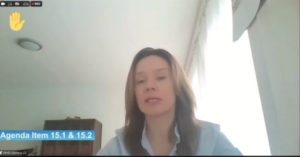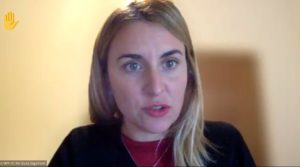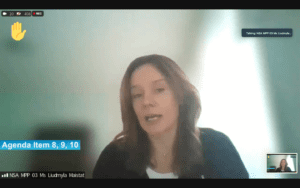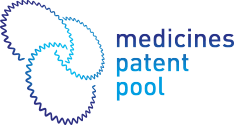MPP’s statements at the 150th session of the Executive Board
27 January 2022
The Medicines Patent Pool delivered some statements at the 150th session of the Executive Board. Follow on social media: #EB150
Agenda item 15.1 – Strengthening WHO preparedness for and response to health emergencies

Speaker: Mila Maistat
The Medicines Patent Pool welcomes the report of the WGPR, and its emphasis on the critical importance of equity, particularly in accessing medical countermeasures.
At MPP, we work to increase access to health technologies for low- and middle-income countries through voluntary licensing focused on public health needs. We have recently negotiated licences on two new antivirals for COVID-19 (molnupiravir and nirmatrelvir) that reduce the risk of hospitalisation and death, each providing access to more affordable generics in about 100 countries.
MPP also leads on the intellectual property and licensing aspects of WHO’s mRNA technology transfer hub which seeks to expand local manufacturing capacity in LMICs.
We believe MPP can make a valuable contribution to pandemic preparedness and response through its expertise in facilitating licensing and technology transfer and look forward to our continued engagement with WHO and Member States.
Previous statement on this topic: MPP’s statement at the 74th World Health Assembly
Agenda item 7 – Political declaration of the third high-level meeting of the General Assembly on the prevention and control of non-communicable diseases

Speaker: Giulia Segafredo
The Medicines Patent Pool (MPP) welcomes the opportunity to comment on the political declaration on non-communicable diseases (NCDs).
Ensuring access to safe, effective, and affordable essential medicines is one of the critical factors necessary to achieve universal health coverage. However, we are still far from having sustainable access mechanisms for NCDs in low- and middle-income countries (LMICs), especially for the most innovative treatments.
We welcome the recent recommendations of the WHO Expert Committee for the Selection and Use of Essential Medicines urging MPP to explore voluntary licenses for innovative NCDs medicines to facilitate access in LMICs. This includes key small molecules and biotherapeutics.
With our experience in building partnerships with industry and other stakeholders; our track record in implementing public health licences; and our growing expertise in supporting technology transfer and local production, MPP re-affirms its commitment to working with WHO and Member States, to improve the availability and affordability of essential medicines for NCDs.
Agenda item 8 – The global health sector strategies on, respectively, HIV, viral hepatitis and sexually transmitted infections

Speaker: Mila Maistat
The Medicines Patent Pool welcomes the draft of global health strategies on HIV, viral hepatitis and STIs for 2022 – 2030. We take note that voluntary licensing on public health-oriented terms and conditions has been recommended as a key mechanism for reducing prices and accelerating access to current WHO-recommended treatments for HIV and viral hepatitis. Besides, voluntary technology sharing and fostering further generic competition is recommended to expand access to new products as well.
Voluntary licensing enabled most of LMICs including some UMICs to get access to quality-assured WHO-recommended HIV and HCV treatments, and considerable progress with treatment uptake was achieved since 2016. MPP stands ready to continue supporting WHO, Member States and other stakeholders in implementing the new strategies, by facilitating access to treatments including innovative products, such as long-acting formulations, be it for prevention or treatment.
Previous statement on this topic: MPP’s statement at the 74th World Health Assembly







